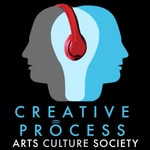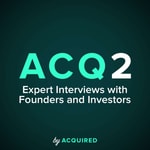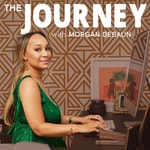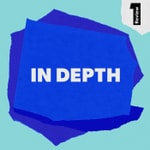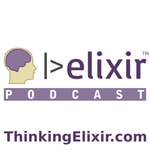Sustainability, Climate Change, Renewable Energy, Politics, Activism, Biodiversity, Carbon Footprint, Wildlife, Regenerative – Details, episodes & analysis
Podcast details
Technical and general information from the podcast's RSS feed.
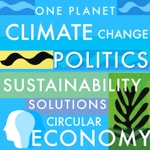
Sustainability, Climate Change, Renewable Energy, Politics, Activism, Biodiversity, Carbon Footprint, Wildlife, Regenerative
Environmental Solutions · One Planet Podcast · Creative Process Original Series
Frequency: 1 episode/3d. Total Eps: 532

The story of our environment may well be the most important story this century. We focus on issues facing people and the planet. Leading environmentalists, organizations, activists, and conservationists discuss meaningful ways to create a better and more sustainable future.
Participants include EARTHDAY.ORG, Greenpeace, UNESCO World Heritage Centre, PETA, European Environment Agency, Peter Singer, 350.org, UNESCO Mahatma Gandhi Institute of Education for Peace and Sustainable Development, Citizens’ Climate Lobby, Earth System Governance Project, Forest Stewardship Council, Global Witness, National Council for Climate Change, Sustainable Development and Public Leadership, Marine Stewardship Council, One Tree Planted, Polar Bears International, EarthLife Africa, Shimon Schwarzschild, and GAIA Centre, among others.
Interviews conducted by artist, activist, and educator Mia Funk with the participation of students and universities around the world. One Planet Podcast Is part of The Creative Process’ environmental initiative.
www.oneplanetpodcast.org
www.creativeprocess.info
INSTAGRAM @creativeprocesspodcast
Recent rankings
Latest chart positions across Apple Podcasts and Spotify rankings.
Apple Podcasts
🇫🇷 France - science
29/07/2025#99🇫🇷 France - science
28/07/2025#69🇫🇷 France - science
27/07/2025#82🇫🇷 France - science
14/03/2025#85🇫🇷 France - science
19/02/2025#77🇫🇷 France - science
18/02/2025#78🇫🇷 France - science
12/02/2025#94🇫🇷 France - science
11/02/2025#61🇫🇷 France - science
05/02/2025#98🇫🇷 France - science
03/02/2025#81
Spotify
No recent rankings available
Shared links between episodes and podcasts
Links found in episode descriptions and other podcasts that share them.
See all- http://www.creativeprocess.info
4801 shares
- http://www.oneplanetpodcast.org
4152 shares
- https://studiorichtermahr.com
247 shares
- https://twitter.com/palumboliu?s=20
270 shares
- https://twitter.com/mroth78
44 shares
- https://twitter.com/docsforclimate
32 shares
RSS feed quality and score
Technical evaluation of the podcast's RSS feed quality and structure.
See allScore global : 58%
Publication history
Monthly episode publishing history over the past years.
Curiosity, Cognition & Adapting to the Uncertainties Climate Change with Neuroscientist DR. JACQUELINE GOTTLIEB
Season 8
mercredi 4 septembre 2024 • Duration 19:45
“So we've all experienced this sense of awe at the vastness of things in nature, and I think that is a beautiful sense. You're in awe at the vastness things that go beyond your capabilities, also capabilities of understanding and capabilities of knowledge. So I look at it as kind of a form of extreme uncertainty that is not threatening. We can relax. It's pleasurable and inspiring. So, maybe if we can remember the sense of awe that we have with certain things, we can help ourselves when, when we have uncertainties (climate change) that are threatening, maybe that's something that we can use to calm us down. About dealing with climate change, people do adjust, and I think we should enable, so far as policy comes about, a lot of policy has to be geared towards allowing people to adapt. Let's say you think that sea level will rise in a particular area. Well, you can build a bigger dam, right? Or, you can build bigger walls. So, the more resources people have, the more efficient they will be in adapting to whatever comes their way.”
Dr. Jacqueline Gottlieb is a Professor of Neuroscience and Principal Investigator at Columbia University’s Zuckerman Mind Brain Behavior Institute. Dr. Gottlieb studies the mechanisms that underlie the brain's higher cognitive functions, including decision making, memory, and attention. Her interest is in how the brain gathers the evidence it needs—and ignores what it doesn’t—during everyday tasks and during special states such as curiosity.
www.creativeprocess.info
www.oneplanetpodcast.org
IG www.instagram.com/creativeprocesspodcast
Wetlands, Methane & Restoring Earth’s Garden of Eden with EUAN NISBET
Season 8
vendredi 30 août 2024 • Duration 45:47
Have we entered what Earth scientists call a “termination event,” and what can we do to avoid the worst outcomes? How can a spiritual connection to nature guide us toward better environmental stewardship? What can ancient wisdom teach us about living harmoniously with the Earth? How have wetlands become both crucial carbon sinks and colossal methane emitters in a warming world?
Euan Nisbet is an Emeritus Professor of Earth Sciences at the Royal Holloway University of London. Specializing in methane and its impact on climate change, his research spans Arctic and Tropical Atmospheric Methane budgets. Nisbet led the MOYA project, focusing on global methane emissions using aircraft and ground-based field campaigns in Africa and South America. Born in Germany and raised in Africa, his field work has taken him around the world. He is the author of The Young Earth and Leaving Eden: To Protect and Manage the Earth.
“I am a Christian and I have strong Muslim and Jewish friends as well as great respect for Hindu beliefs. I grew up in Southern Africa and I am well aware of the depth of some Indigenous beliefs. I think that having belief systems does give you a very different perspective sometimes. Now, in Christianity, the concept of the shepherd, human beings are here and this is our garden, our garden of Eden, but we have a responsibility. And if we choose to kick ourselves out of the garden, there are consequences. And that's precisely what we are doing. The garden is there, it's lovely, and we can manage it, and it's our job to manage it. We can manage it properly. We can respect it. It's for all creation, and it's very explicit that it involves all Creation. And that's a very fundamental biblical law that you have to respect all Creation. And if you don't do that, then the consequences—you’re basically throwing yourself out of the Garden of Eden."
https://pure.royalholloway.ac.uk/en/persons/euan-nisbet
www.creativeprocess.info
www.oneplanetpodcast.org
IG www.instagram.com/creativeprocesspodcast
How Do Utopian Visions Shape Our Reality & Future? - Highlights - S. D. CHROSTOWSKA
Season 8
jeudi 25 juillet 2024 • Duration 20:46
“I think that we should not be under any illusion that we can return to some pristine Earth. We have to do the best we can with the Earth that we have inherited for our generation and for those of our children, but we should not, therefore, say, well, it's all lost. Species are becoming extinct as never before. We should not become pessimists because there is no other alternative, because we've been robbed of this idea of pristine nature.
I think nature has not been pristine. People speak about the Anthropocene. I don't quite like this term, but the idea that humans have been transforming nature and have been altering it, adulterating it, something to put into perspective regarding this nostalgia for pristine nature. And utopianism actually goes hand in hand with nostalgia. I mentioned the myth of the Golden Age. This was something that used to exist, the Golden Age or paradise, an idea of pure nature in harmony with human beings. These nostalgic imaginaries that feed into and can reactivate utopian thinking in our day. We should by no means let go of an idea of pristine nature. And I also don't think, just to return to this idea of species extinction. I don't think that the de-extinction efforts are particularly utopian, even though they may seem this way. How do we compensate for the material loss of biodiversity? I think no amount of technological ingenuity will actually fulfill this desire for a return to the pristine nature that we have lost.”
S. D. Chrostowska is professor of humanities at York University, Canada. She is the author of several books, among them Permission, The Eyelid, A Cage for Every Child, and, most recently, Utopia in the Age of Survival: Between Myth and Politics. Her essays have appeared in such venues as Public Culture, Telos, Boundary 2, and The Hedgehog Review. She also coedits the French surrealist review Alcheringa and is curator of the 19th International Exhibition of Surrealism, Marvellous Utopia, which runs from July to September 2024 in Saint-Cirq-Lapopie, France.
https://profiles.laps.yorku.ca/profiles/sylwiac/
www.creativeprocess.info
www.oneplanetpodcast.org
IG www.instagram.com/creativeprocesspodcast
LEAH THOMAS - Author of The Intersectional Environmentalist - Founder of IE Platform & @GreenGirlLeah
Season 6
lundi 13 novembre 2023 • Duration 36:35
Leah Thomas is an intersectional environmental activist and eco-communicator based in Southern California. She’s passionate about advocating for and exploring the relationship between social justice and environmentalism and was the first to define the term “Intersectional Environmentalism.” She is the founder of @greengirlleah and The Intersectional Environmentalist platform. Her articles on this topic have appeared in Vogue, Elle, The Good Trade, and Youth to the People and she has been featured in Harper’s Bazaar, W Magazine, Domino, GOOP, Fashionista, BuzzFeed, and numerous podcasts. She has a B.S. in Environmental Science and Policy from Chapman University and worked for the National Park Service and Patagonia headquarters before pursuing activism full time. She lives in Carpinteria, California. She is the author of The Intersectional Environmentalist: How to Dismantle Systems of Oppression to Protect People + Planet, and Winner of the Creative Force Foundation Award 2023.
"So I think the first step is definitely awareness. I know when I was the only Black student in my environmental science program, I didn't quite understand why I really wanted to focus on the environmental injustices that were going on in my neighborhood. Or the concept of racial justice was always kind of intertwined with my environmental advocacy. So it's something that I want other communities of color to understand that that's okay, that you can show up to this field and also have empathy for your own community and that you don't need to separate your identity from your environmental practice. And including your cultural background can actually enhance the work that you do because I think it's such a beautiful thing that we all have different identity aspects, whether that's religion, race, gender, etc.
So I think that's the first step, making sure that representation is there so all people can see themselves reflected in environmental education and feel empowered to know that they belong and they can take their identity with them and that enhances their environmental practice. And secondly, through The Intersectional Environmentalist Platform, we love to platform students who are working on climate justice research and share it through kind of untraditional means. So they might not be published in a scientific paper, but it's something they can share amongst their peers in our community of about half a million people, etc. So it's another way for them to share their research at the intersection of identity and environmentalism with more people. And that's something I really enjoy with our work, just letting people know that, yeah, your work is important, even if it's not published in a scientific paper. There is a really big community of people out there who are interested in learning and might even relate to that research."
www.intersectionalenvironmentalist.com
www.instagram.com/greengirlleah
www.hachettebookgroup.com/titles/leah-thomas/the-intersectional-environmentalist/9780316281935/?lens=voracious
Season 2 of Business & Society focuses on CEOs , Sustainability & Environmental Solutions
Business & Society is a limited series co-hosted by Bruce Piasecki & Mia Funk
www.oneplanetpodcast.org
Highlights - MICHAEL S. ROTH - President of Wesleyan University - Author of The Student: A Short History
Season 6
vendredi 10 novembre 2023 • Duration 12:42
“So I wrote this book and it was a lot of fun because I had to learn so much. The book examines three iconic teachers: Confucius, Socrates, and Jesus. And I look at how each of those teachers encourage a certain kind of student. The student as follower, someone who will take on the path that you've developed. In the case of Socrates, the student as critical interlocutor or critical conversation partner, someone who will, in dialogue with you, learn what they don't know, how to take things apart. And in the case of Jesus and the apostles, I look at trying to imitate a way of life to transform themselves to strive towards being the kind of person that Jesus incarnated. And so that's the beginning of the book, these models of studenthood, if I could use that word, and being a teacher. And then I look at the way in which these ideas reverberate in the West across a long period of time. So I'm interested in the idea of the student before there were schools. What did we expect young people to learn even when they weren't going to school?”
What is the purpose of education? How are we educating students for the future? What is the importance of the humanities in this age of AI and the rapidly changing workplace?
Michael S. Roth is President of Wesleyan University. His books include Beyond the University: Why Liberal Education Matters and Safe Enough Spaces: A Pragmatist’s Approach to Inclusion, Free Speech, and Political Correctness on College Campuses. He's been a Professor of History and the Humanities since 1983, was the Founding Director of the Scripps College Humanities Institute, and was the Associate Director of the Getty Research Institute. His scholarly interests center on how people make sense of the past, and he has authored eight books around this topic, including his latest, The Student: A Short History.
https://www.wesleyan.edu/academics/faculty/mroth/profile.html
https://yalebooks.yale.edu/book/9780300250039/the-student/
www.wesleyan.edu
https://twitter.com/mroth78
www.creativeprocess.info
www.oneplanetpodcast.org
IG www.instagram.com/creativeprocesspodcast
MICHAEL S. ROTH - President of Wesleyan University - Author of The Student: A Short History
Season 6
mercredi 8 novembre 2023 • Duration 48:06
Michael S. Roth is President of Wesleyan University. His books include Beyond the University: Why Liberal Education Matters and Safe Enough Spaces: A Pragmatist’s Approach to Inclusion, Free Speech, and Political Correctness on College Campuses. He's been a Professor of History and the Humanities since 1983, was the Founding Director of the Scripps College Humanities Institute, and was the Associate Director of the Getty Research Institute. His scholarly interests center on how people make sense of the past, and he has authored eight books around this topic, including his latest, The Student: A Short History.
“I've been President now for more than 15 years, and we've created I think six new interdisciplinary colleges in that period. There were two when I started, and they had been there for 50 years, but we've created a College of the Environment, a College of Film and the Moving Image, a College of Education, College of Integrated Sciences, College of East Asian Studies, and a College of Design and Engineering, the newest one. And I love these things because they bring different disciplines. In the College of the Environment, you can have a biologist, a dancer, an anthropologist, and an economist, and they're all worrying about a certain problem in environmental studies, but they come at it from different perspectives, and they join together in their work. That's extremely exciting.”
https://www.wesleyan.edu/academics/faculty/mroth/profile.html
https://yalebooks.yale.edu/book/9780300250039/the-student/
www.wesleyan.edu
https://twitter.com/mroth78
www.creativeprocess.info
www.oneplanetpodcast.org
IG www.instagram.com/creativeprocesspodcast
Highlights - BRIAN DAVID JOHNSON - Director of the ASU Threatcasting Lab - Author of The Future You
Season 6
samedi 4 novembre 2023 • Duration 11:00
"I think the most important thing that I would like young people to know is that they can build their future. That they have the power and they have the agency to shape their future and they have the ability and the power when working with others to have an even broader impact.
The thing that scares me the most about the future is when people give up that agency and they let other people design their futures for them. For me, I think it's incredibly powerful to go to young people and say you can do it. But also you need to tell me what you want. And I think empowering them to have a vision for the future, that's why I spend so much time in schools and talking to young people because it's those visions that I think are incredibly important."
Brian David Johnson is Futurist in Residence at Arizona State University’s Center for Science and the Imagination, a professor in the School for the Future of Innovation in Society, and the Director of the ASU Threatcasting Lab. He is Author of The Future You: How to Create the Life You Always Wanted, Science Fiction Prototyping: Designing the Future with Science Fiction, 21st Century Robot: The Dr. Simon Egerton Stories, Humanity in the Machine: What Comes After Greed?, Screen Future: The Future of Entertainment, Computing, and the Devices We Love.
https://csi.asu.edu/people/brian-david-johnson/
www.creativeprocess.info
www.oneplanetpodcast.org
IG www.instagram.com/creativeprocesspodcast
BRIAN DAVID JOHNSON - Author of The Future You: How to Create the Life You Always Wanted - Futurist in Residence, ASU’s Center for Science & the Imagination
Season 6
vendredi 3 novembre 2023 • Duration 47:15
Brian David Johnson is Futurist in Residence at Arizona State University’s Center for Science and the Imagination, a professor in the School for the Future of Innovation in Society, and the Director of the ASU Threatcasting Lab. He is Author of The Future You: How to Create the Life You Always Wanted, Science Fiction Prototyping: Designing the Future with Science Fiction, 21st Century Robot: The Dr. Simon Egerton Stories, Humanity in the Machine: What Comes After Greed?, Screen Future: The Future of Entertainment, Computing, and the Devices We Love.
"I think the most important thing that I would like young people to know is that they can build their future. That they have the power and they have the agency to shape their future and they have the ability and the power when working with others to have an even broader impact.
The thing that scares me the most about the future is when people give up that agency and they let other people design their futures for them. For me, I think it's incredibly powerful to go to young people and say you can do it. But also you need to tell me what you want. And I think empowering them to have a vision for the future, that's why I spend so much time in schools and talking to young people because it's those visions that I think are incredibly important."
https://csi.asu.edu/people/brian-david-johnson/
www.creativeprocess.info
www.oneplanetpodcast.org
IG www.instagram.com/creativeprocesspodcast
Highlights - SUSAN SCHNEIDER - Author of Artificial You: AI and the Future of Your Mind, Fmr. Distinguished Scholar, US Library of Congress
Season 6
mardi 31 octobre 2023 • Duration 13:08
"I'm using ChatGPT Plus, and you can do much better research. I think the scientific possibilities are amazing, and it's a very good research assistant. There are plugins you can use to go through scientific papers quickly. And if you feed it the right sort of data, it has near instantaneous access to a range of facts that helps me in my field. And I think any system that has these kinds of capacities...it's a sort of crowdsourced brain if you will. So it's roughly like the neocortex, very roughly. And it's a neocortex without a limbic system. So it's just an association engine without necessarily emotions, but it's able to quickly access a range of materials that humans can't. So there should be intriguing scientific discoveries, drug discovery, and computations. And of course, involving climate change."
Will AI become conscious? President Biden has just unveiled a new executive order on AI — the U.S. government’s first action of its kind — requiring new safety assessments, equity and civil rights guidance, and research on AI’s impact on the labor market. With this governance in place, can tech companies be counted on to do the right thing for humanity?
Susan Schneider is a philosopher, artificial intelligence expert, and founding director of the Center for the Future Mind at Florida Atlantic University. She is author of Artificial You: AI and the Future of Your Mind, Science Fiction and Philosophy: From Time Travel to Superintelligence, and The Blackwell Companion to Consciousness. She held the NASA Chair with NASA and the Distinguished Scholar Chair at the Library of Congress. She is now working on projects related to advancements in AI policy and technology, drawing from neuroscience research and philosophical developments and writing a new book on the shape of intelligent systems.
www.fau.edu/artsandletters/philosophy/susan-schneider/index
www.fau.edu/future-mind/
www.creativeprocess.info
www.oneplanetpodcast.org
IG www.instagram.com/creativeprocesspodcast
SUSAN SCHNEIDER - Director, Center for the Future Mind, FAU, Fmr. NASA Chair at NASA
Season 6
lundi 30 octobre 2023 • Duration 34:27
Will AI become conscious? President Biden has just unveiled a new executive order on AI — the U.S. government’s first action of its kind — requiring new safety assessments, equity and civil rights guidance, and research on AI’s impact on the labor market. With this governance in place, can tech companies be counted on to do the right thing for humanity?
Susan Schneider is a philosopher, artificial intelligence expert, and founding director of the Center for the Future Mind at Florida Atlantic University. She is author of Artificial You: AI and the Future of Your Mind, Science Fiction and Philosophy: From Time Travel to Superintelligence, and The Blackwell Companion to Consciousness. She held the NASA Chair with NASA and the Distinguished Scholar Chair at the Library of Congress. She is now working on projects related to advancements in AI policy and technology, drawing from neuroscience research and philosophical developments and writing a new book on the shape of intelligent systems.
"I'm using ChatGPT Plus, and you can do much better research. I think the scientific possibilities are amazing, and it's a very good research assistant. There are plugins you can use to go through scientific papers quickly. And if you feed it the right sort of data, it has near instantaneous access to a range of facts that helps me in my field. And I think any system that has these kinds of capacities...it's a sort of crowdsourced brain if you will. So it's roughly like the neocortex, very roughly. And it's a neocortex without a limbic system. So it's just an association engine without necessarily emotions, but it's able to quickly access a range of materials that humans can't. So there should be intriguing scientific discoveries, drug discovery, and computations. And of course, involving climate change."
www.fau.edu/artsandletters/philosophy/susan-schneider/index
www.fau.edu/future-mind/
www.creativeprocess.info
www.oneplanetpodcast.org
IG www.instagram.com/creativeprocesspodcast


